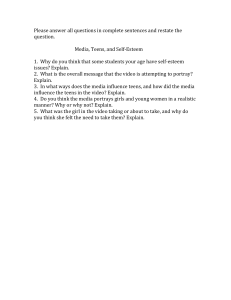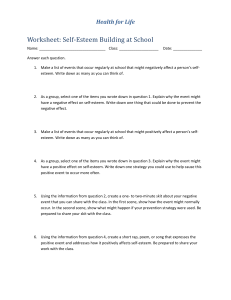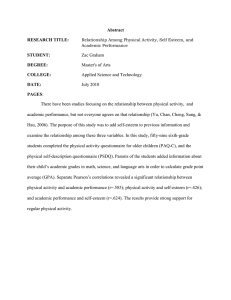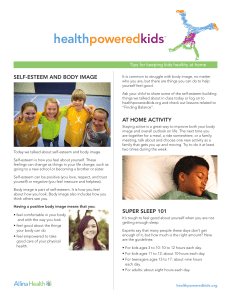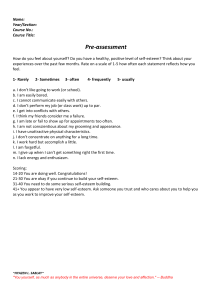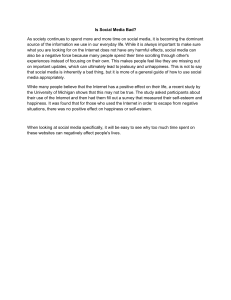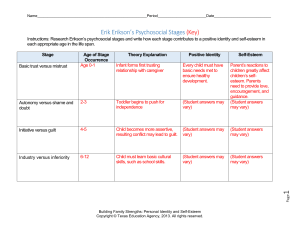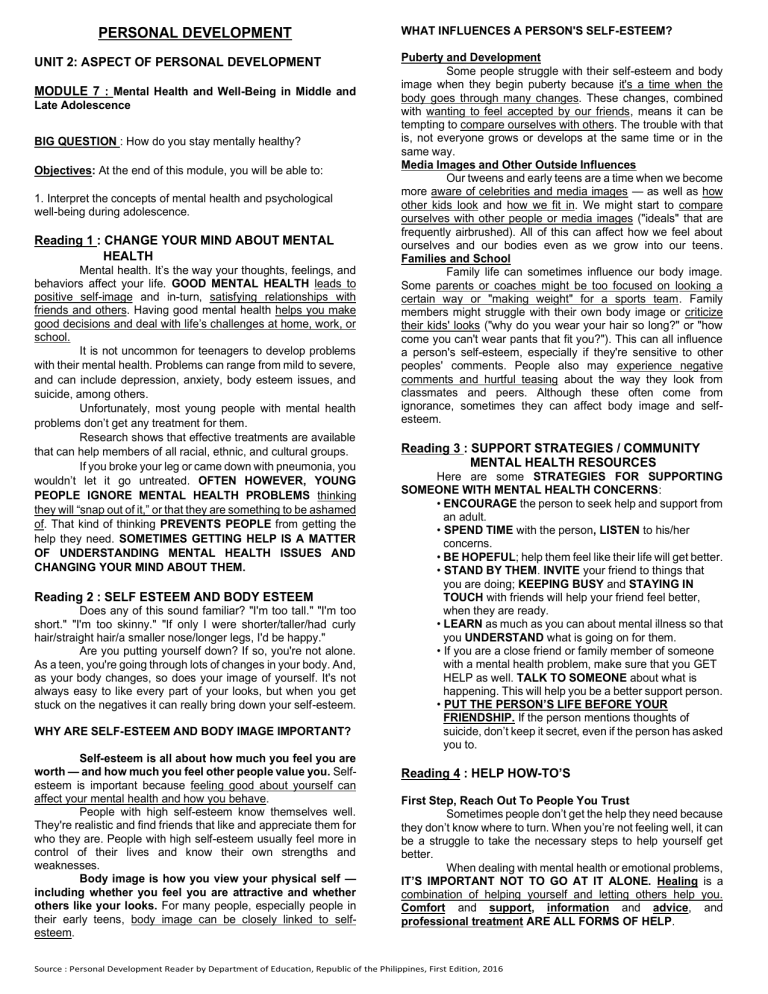
PERSONAL DEVELOPMENT UNIT 2: ASPECT OF PERSONAL DEVELOPMENT MODULE 7 : Mental Health and Well-Being in Middle and Late Adolescence BIG QUESTION : How do you stay mentally healthy? Objectives: At the end of this module, you will be able to: 1. Interpret the concepts of mental health and psychological well-being during adolescence. Reading 1 : CHANGE YOUR MIND ABOUT MENTAL HEALTH Mental health. It’s the way your thoughts, feelings, and behaviors affect your life. GOOD MENTAL HEALTH leads to positive self-image and in-turn, satisfying relationships with friends and others. Having good mental health helps you make good decisions and deal with life’s challenges at home, work, or school. It is not uncommon for teenagers to develop problems with their mental health. Problems can range from mild to severe, and can include depression, anxiety, body esteem issues, and suicide, among others. Unfortunately, most young people with mental health problems don’t get any treatment for them. Research shows that effective treatments are available that can help members of all racial, ethnic, and cultural groups. If you broke your leg or came down with pneumonia, you wouldn’t let it go untreated. OFTEN HOWEVER, YOUNG PEOPLE IGNORE MENTAL HEALTH PROBLEMS thinking they will “snap out of it,” or that they are something to be ashamed of. That kind of thinking PREVENTS PEOPLE from getting the help they need. SOMETIMES GETTING HELP IS A MATTER OF UNDERSTANDING MENTAL HEALTH ISSUES AND CHANGING YOUR MIND ABOUT THEM. Reading 2 : SELF ESTEEM AND BODY ESTEEM Does any of this sound familiar? "I'm too tall." "I'm too short." "I'm too skinny." "If only I were shorter/taller/had curly hair/straight hair/a smaller nose/longer legs, I'd be happy." Are you putting yourself down? If so, you're not alone. As a teen, you're going through lots of changes in your body. And, as your body changes, so does your image of yourself. It's not always easy to like every part of your looks, but when you get stuck on the negatives it can really bring down your self-esteem. WHY ARE SELF-ESTEEM AND BODY IMAGE IMPORTANT? Self-esteem is all about how much you feel you are worth — and how much you feel other people value you. Selfesteem is important because feeling good about yourself can affect your mental health and how you behave. People with high self-esteem know themselves well. They're realistic and find friends that like and appreciate them for who they are. People with high self-esteem usually feel more in control of their lives and know their own strengths and weaknesses. Body image is how you view your physical self — including whether you feel you are attractive and whether others like your looks. For many people, especially people in their early teens, body image can be closely linked to selfesteem. WHAT INFLUENCES A PERSON'S SELF-ESTEEM? Puberty and Development Some people struggle with their self-esteem and body image when they begin puberty because it's a time when the body goes through many changes. These changes, combined with wanting to feel accepted by our friends, means it can be tempting to compare ourselves with others. The trouble with that is, not everyone grows or develops at the same time or in the same way. Media Images and Other Outside Influences Our tweens and early teens are a time when we become more aware of celebrities and media images — as well as how other kids look and how we fit in. We might start to compare ourselves with other people or media images ("ideals" that are frequently airbrushed). All of this can affect how we feel about ourselves and our bodies even as we grow into our teens. Families and School Family life can sometimes influence our body image. Some parents or coaches might be too focused on looking a certain way or "making weight" for a sports team. Family members might struggle with their own body image or criticize their kids' looks ("why do you wear your hair so long?" or "how come you can't wear pants that fit you?"). This can all influence a person's self-esteem, especially if they're sensitive to other peoples' comments. People also may experience negative comments and hurtful teasing about the way they look from classmates and peers. Although these often come from ignorance, sometimes they can affect body image and selfesteem. Reading 3 : SUPPORT STRATEGIES / COMMUNITY MENTAL HEALTH RESOURCES Here are some STRATEGIES FOR SUPPORTING SOMEONE WITH MENTAL HEALTH CONCERNS: • ENCOURAGE the person to seek help and support from an adult. • SPEND TIME with the person, LISTEN to his/her concerns. • BE HOPEFUL; help them feel like their life will get better. • STAND BY THEM. INVITE your friend to things that you are doing; KEEPING BUSY and STAYING IN TOUCH with friends will help your friend feel better, when they are ready. • LEARN as much as you can about mental illness so that you UNDERSTAND what is going on for them. • If you are a close friend or family member of someone with a mental health problem, make sure that you GET HELP as well. TALK TO SOMEONE about what is happening. This will help you be a better support person. • PUT THE PERSON’S LIFE BEFORE YOUR FRIENDSHIP. If the person mentions thoughts of suicide, don’t keep it secret, even if the person has asked you to. Reading 4 : HELP HOW-TO’S First Step, Reach Out To People You Trust Sometimes people don’t get the help they need because they don’t know where to turn. When you’re not feeling well, it can be a struggle to take the necessary steps to help yourself get better. When dealing with mental health or emotional problems, IT’S IMPORTANT NOT TO GO AT IT ALONE. Healing is a combination of helping yourself and letting others help you. Comfort and support, information and advice, and professional treatment ARE ALL FORMS OF HELP. Source : Personal Development Reader by Department of Education, Republic of the Philippines, First Edition, 2016 THINK OF ALL THE PEOPLE YOU CAN TURN TO FOR SUPPORT. These are people who are concerned about you and can help comfort you, who will listen to you and encourage you, and who can help arrange for treatment. In other words, find caring people in your life who can help you. These people might include: • friends • parents and other family members • someone who seems “like a parent” to you • other adults whose advice you would value—perhaps a favorite teacher or coach, a member of your church or other place of worship, or a good friend’s parent. RESEARCH SHOWS THAT MALES are more reluctant to look for help and receive it than females are. While some people may have difficulty reaching out to others they trust, taking the first step in getting help is important for everyone to do. Second Step, Take Action The more you know, the easier it is LIBRARIES ARE AN EXCELLENT SOURCE OF INFORMATION ABOUT MENTAL HEALTH. Bookstores often have “self-help” or “psychology” sections. For those with Internet access, there are many websites related to health and mental health. Some are better in quality than others. It is important to know if the information on a site comes from sources you can trust. USE CAUTION whenever you’re sharing or exchanging information online: there’s a chance that it will not be kept private. Nothing is worse than nothing The CONSEQUENCES OF NOT GETTING HELP FOR MENTAL HEALTH PROBLEMS can be serious. Untreated problems often continue and become worse, and new problems may occur. For example, someone with panic attacks might begin drinking too much alcohol with the mistaken hope that it will help relieve his or her emotional pain. It’s All in the Attitude There are many REASONS WHY PEOPLE DO NOT GET HELP FOR MENTAL HEALTH PROBLEMS. Fear, shame, and embarrassment often prevent individuals and their families from doing anything. Sometimes being able to get the help, support, and professional treatment you need is a matter of changing your mind about mental health and changing the way you react to mental health problems. Here are some IMPORTANT REMINDERS: • Mental health is as important as physical health. In fact, the two are closely linked. • Mental health problems are real, and they deserve to be treated. • It’s not a person’s fault if he or she has a mental health problem. No one is to blame. • Mental health problems are not a sign of weakness. They are not something you can “just snap out of” even if you try. • Whether you’re male or female, it’s ok to ask for help and get it. • There’s hope. People improve and recover with the help of treatment, and they are able to enjoy happier and healthier lives. Reading 5 : HEALTHY EATING AND MENTAL HEALTH HEALTHY EATING nourishes the body, including the brain, and supports mental health through: • Improved overall health and vitality • Increased ability to concentrate • Reduced irritability and mood swings • Lowered risk of mental illness There is some evidence that healthy eating may be a factor in lowered risk of depression and improved ability to deal with stress and anxiety (Healthy U Alberta, 2009). PHYSICAL ACTIVITY AND MENTAL HEALTH: PHYSICAL ACTIVITY can make you feel good physically and build confidence. Evidence suggests that physical activity may contribute to improved mood and increased self-esteem, self-confidence and sense of control (UK Dept of Health, 2004; Fox, 1999). Some types of physical activity may provide an opportunity to connect with others and develop supportive relationships. GETTING PHYSICALLY ACTIVE MAY (CSEP, 2011): • Make you feel better physically and feel better about yourself. • Improve your mood. • Improve self-esteem • Reduce physical reactions to stress. • Help you sleep better. • Give you more energy. Physical activity may be effective in preventing or reducing symptoms associated with anxiety and depression. How physical activity improves mood and relieves anxiety is not yet clear. SOME THEORIES PROPOSE THAT PHYSICAL ACTIVITY (UK Dept. of Health, 2004; Fox, 1999): • Increases body temperature, thus relaxing muscle tension. • Releases feel-good chemicals that improve mood. • Offers a “time-out” from worries and depressing thoughts. • Increases self-confidence, feeling of competence and a sense of mastery. • Provides a sense of belonging and mutual support when participating with others. SLEEP AND MENTAL HEALTH Most teens need 9-11 hours of sleep every night. PROBLEMS FROM NOT BEING FULLY RESTED include: • Irritability • Difficulty concentrating and learning • Don’t move information from short-term to long-term memory as well • Falling asleep in class • Mood swings and behavior problems • More accident prone • More prone to depression SUGGESTIONS FOR GETTING A GOOD NIGHT SLEEP: • Stay away from stimulants like caffeine in the evening, including chocolate, colas, and other caffeinated beverages. These delay sleep and increase night waking. • Do not go to bed hungry, have a light snack. • Turn off any TV’s, computes, or cellphones, or just do not have electronics in the bedroom. • Disengage from any stimulating activities like exercise, computer games or talking on the phone for at least 30 minutes prior to bedtime. Reading is much more relaxing and may help you fall asleep. • Taking a warm bath or shower helps prepare the body for sleep. • If you are not feeling rested and functioning at your best most days, talk to your parents. You may need to speak to a doctor if you are having problems sleeping in spite of trying the above tips. • Try a cup of hot milk. Source : Personal Development Reader by Department of Education, Republic of the Philippines, First Edition, 2016

